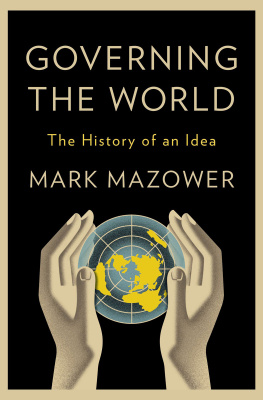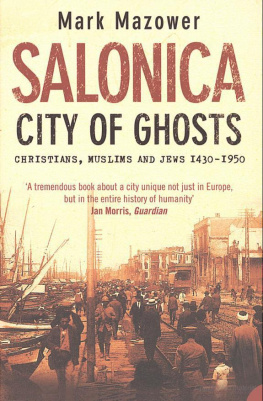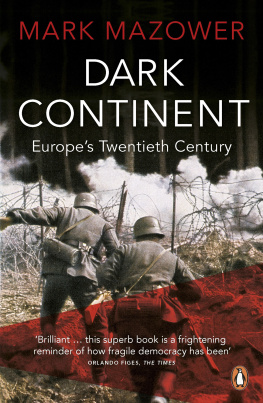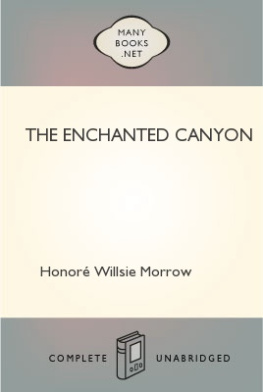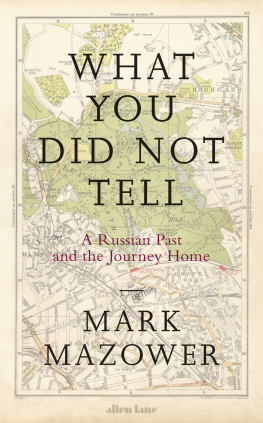Mazower - No Enchanted Palace
Here you can read online Mazower - No Enchanted Palace full text of the book (entire story) in english for free. Download pdf and epub, get meaning, cover and reviews about this ebook. year: 2012, publisher: Princeton University Press, genre: Politics. Description of the work, (preface) as well as reviews are available. Best literature library LitArk.com created for fans of good reading and offers a wide selection of genres:
Romance novel
Science fiction
Adventure
Detective
Science
History
Home and family
Prose
Art
Politics
Computer
Non-fiction
Religion
Business
Children
Humor
Choose a favorite category and find really read worthwhile books. Enjoy immersion in the world of imagination, feel the emotions of the characters or learn something new for yourself, make an fascinating discovery.
No Enchanted Palace: summary, description and annotation
We offer to read an annotation, description, summary or preface (depends on what the author of the book "No Enchanted Palace" wrote himself). If you haven't found the necessary information about the book — write in the comments, we will try to find it.
Mazower: author's other books
Who wrote No Enchanted Palace? Find out the surname, the name of the author of the book and a list of all author's works by series.
No Enchanted Palace — read online for free the complete book (whole text) full work
Below is the text of the book, divided by pages. System saving the place of the last page read, allows you to conveniently read the book "No Enchanted Palace" online for free, without having to search again every time where you left off. Put a bookmark, and you can go to the page where you finished reading at any time.
Font size:
Interval:
Bookmark:

No Enchanted Palace

LAWRENCE STONE LECTURES
Sponsored by
The Shelby Cullom Davis Center for Historical Studies and Princeton University Press 2008
A list of titles in this series appears at the back of the book.
Mark Mazower
No Enchanted Palace

The End of Empire and the Ideological Origins of the United Nations
PRINCETON UNIVERSITY PRESS
PRINCETON AND OXFORD
Copyright 2009 by Mark Mazower
Requests for permission to reproduce material from this work should be sent to Permissions, Princeton University Press
Published by Princeton University Press, 41 William Street, Princeton, New Jersey 08540
In the United Kingdom: Princeton University Press, 6 Oxford Street, Woodstock, Oxfordshire OX20 1TW
press.princeton.edu
All Rights Reserved
Fifth printing, and first paperback printing, 2013
Paperback ISBN 978-0-691-15795-5
The Library of Congress has cataloged the cloth edition of this book as follows
Mazower, Mark.
No enchanted palace : the end of empire and the ideological origins of the United Nations / Mark Mazower.
p. cm. (Lawrence Stone lectures)
Includes bibliographical references and index.
ISBN 978-0-691-13521-2 (hardcover : alk. paper)
1. United NationsHistory. 2. ImperialismHistory20th century. 3. World politics19001945. I. Title.
JZ4986.M39 2010
341.23dc22
2009016699
British Library Cataloging-in-Publication Data is available
This book has been composed in Sabon text with Constantia Display
Printed on acid-free paper.
Printed in the United States of America
10 9 8 7 6 5
Contents
The Jews and the Lessons of the Nazi New Order
Acknowledgments
I am greatly indebted to Gyan Prakash, the Davis Center for Historical Studies, and the Department of History at Princeton University for the invitation to deliver the 2007 Stone Lectures on which much of this book is based, and for their generous hospitality. I was fortunate enough to get to know Lawrence Stone in his last years at Princeton, and I feel honored to be able to offer this small tribute to him. I am grateful to Princeton University Press for their support of the lectures and of their publication, and to Brigitta van Rheinberg in particular for her attentive readings of successive drafts and many insightful suggestions. was originally delivered as the 2008 Tsakopoulos Lecture at Columbia University, and my thanks go to Kyriakos Tsakopoulos for the invitation to deliver that lecture. I should also like to acknowledge the help I received in thinking through these issues from among others Cemil Aydin, Duncan Bell, Manu Bhagavan, Alan Brinkley, Partha Chatterjee, Saul Dubow, Marwa Elshakry, Sheldon Garon, Nicolas Guilhot, Peter Mandler, Scott Moyers, Samuel Moyn, Phil Nord, Susan Pedersen, Derek Penslar, Carne Ross, Mira Siegelberg, Anders Stephanson, Helen Tilly, and Stephen Wertheim. Discussing these issues with my students at Columbia and at seminars at the Center for International History has in some ways helped most of all.
No Enchanted Palace

| Introduction |
We cannot indeed claim that our work is perfect or that we have created an unbreakable guarantee of peace. For ours is no enchanted palace to spring into sight at once, by magic touch or hidden power. But we have, I am convinced, forged an instrument by which, if men are serious in wanting peace and are ready to make sacrifices for it, they may find means to win it.
Remarks by Lord Halifax, British ambassador to the United States and acting chairman of the UK delegation, San Francisco, 26 June 1945
A new chapter in the history of the United Nations has begun. With these confident words, Secretary-General Boutros Boutros-Ghali greeted the end of the Cold War and hailed the extraordinary opportunity it presented his organization. The decades-long standoff between the superpowers had marginalized it, but the collapse of the USSR offered the UN not only challenges but renewed meaning. Its peacekeeping role could now be expanded and the mandate for its soldiers made more robust. It could take an active role not only in resettling refugees from war-torn states but also in facilitating political
Here was the dream of a new founding momentas if the world had turned back the clock to the hopes of 1945. Yet if such an opportunity really existed, it was gone almost at once. Civil wars in the Balkans and Africa, and above all the genocide in Rwanda in 1994, provoked critics to fume at the UNs impotence. A series of high-level initiatives designed to reform the organization since then have run aground, while new and previously unimagined layers of internal corruption came to light. Prodded by the Clinton administration, NATO bombed Kosovo without Security Council approval, setting a precedent in which the UN was bypassed in the name of humanitarian intervention. In the new millennium, the administration of George W. Bush advanced a national security doctrine whose advocacy of preemptive war marked an unabashed repudiation of the basic principles on which the UN had been founded. Under Ronald Reagan, the United States had earlier weakened ties with the International Court of Justice; now it also turned its back on the new International Criminal Court, and it undermined international arms control regimes as
Today there is no shortage of proposals to reform it. Some want it to be streamlined to allow fast military action against rogue states and other international outlaws: maybe the Security Council can be enlarged, the veto power of the permanent members weakened, the idea of a UN military staff resurrected. Others feel it should move more toughly against human rights offenders among its own members and do more to stamp certain valuesfreedom, for instance, and democracyon the world before it is too late (and, though the fear is rarely voiced, before the Chinese take over). There is the call for it to promote something called human securitya blend of development goals and rightsand to claim the right to intervene in defense of the worlds citizens when their own governments maltreat them. Yet the suspicion that it is basically too far gone for any reform to restore it to a central role in international affairs is pervasive. Few people seem to feel that the world would
This is a discussion about the UNs future place in the international system. But inevitably it rests on an understanding of its past. Indeed, the intensity of present disillusionment is closely linked to a sense of despair at how far it has fallen short of the standard supposedly set by its founders. Secretary-General Boutros-Ghali justified his expansive 1992 vision of what the UN should do as a way of belatedly realizing the lofty goals originally envisaged by the charter. Critics agreed. The UNs rules had long been in abeyance; said one commentator, defending U.S. policy in the spring of 2003, There had been no progress for years. The international system, he went on, had simply developed in a way that condemned the UN to fade into irrelevance, or at best, to limp along. The Bush administration was harsher still. It foresaw the UN headed for complete irrelevancejust like the League of Nations between the warsif it failed to get tough with Saddam Hussein: the invasion of Iraq was, it claimed, adverting to the 1930s, its Abyssinia crisis, or perhaps even Munich.
Next pageFont size:
Interval:
Bookmark:
Similar books «No Enchanted Palace»
Look at similar books to No Enchanted Palace. We have selected literature similar in name and meaning in the hope of providing readers with more options to find new, interesting, not yet read works.
Discussion, reviews of the book No Enchanted Palace and just readers' own opinions. Leave your comments, write what you think about the work, its meaning or the main characters. Specify what exactly you liked and what you didn't like, and why you think so.



